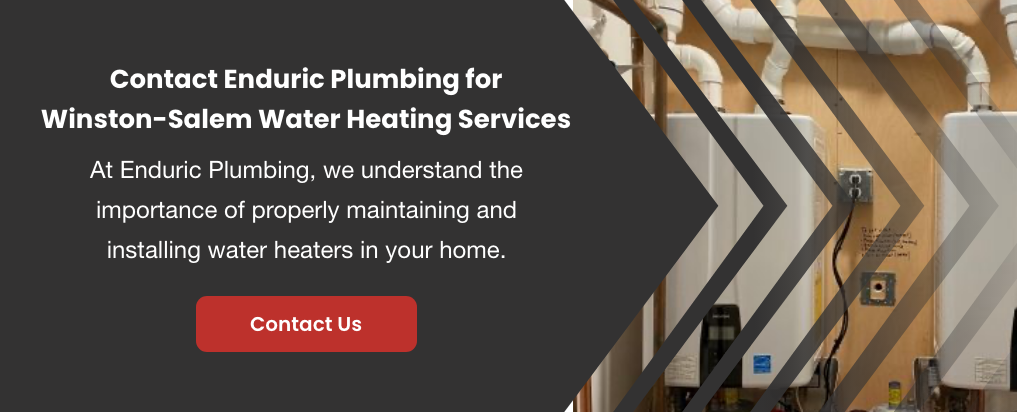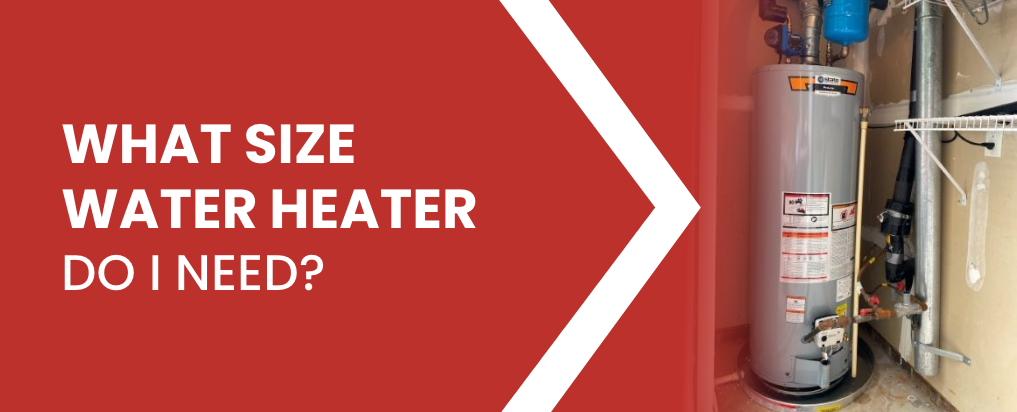
May 5, 2022
Contents
Finding the right water heater is crucial for living comfortably in your home. Making sure your water heater can provide hot water for all of your household needs at a reasonable cost can save your family money and energy. On average, water heating accounts for 14-18% of your utility bill, making it the second-largest expense for your home.
When selecting a tank, you have to make a few considerations. Choosing the right tank and performing regular maintenance and inspections ensures your household has the hot water it needs for years to come.
What size water heater do you need for a family of three, four, five or more? Use this article to learn more about the different types of water heaters and how to choose the right size and features for your home.
How to Determine What Size Water Heater You Need
Before exploring the different water heater options, you should evaluate the features that may affect the heater you can put in your home. When looking for a water heater, figure out:
- Fuel: What fuel sources are available in your area — natural gas, propane, electric, solar, geothermal? Not every site has access to all types of energy. Depending on your location, some fuels will be more expensive than others.
- Costs: What’s your budget? Estimating the purchase and operating costs of heaters beforehand lets you choose the best fit for your budget. Costs include fuel type, tank size, installation costs, maintenance fees and other accommodations down the line.
- Size: Examine your water usage and estimate the size of tank you’ll need to meet your hot water requirements for a day. If it’s too small, you’ll run out of hot water during peak hours of use. If it’s too large, you’ll spend more money on a unit you don’t need.
- Efficiency: Different styles of heaters have different energy efficiencies. Check EnergyStar ratings and fuel availability to work out the most energy-efficient heater for your house.
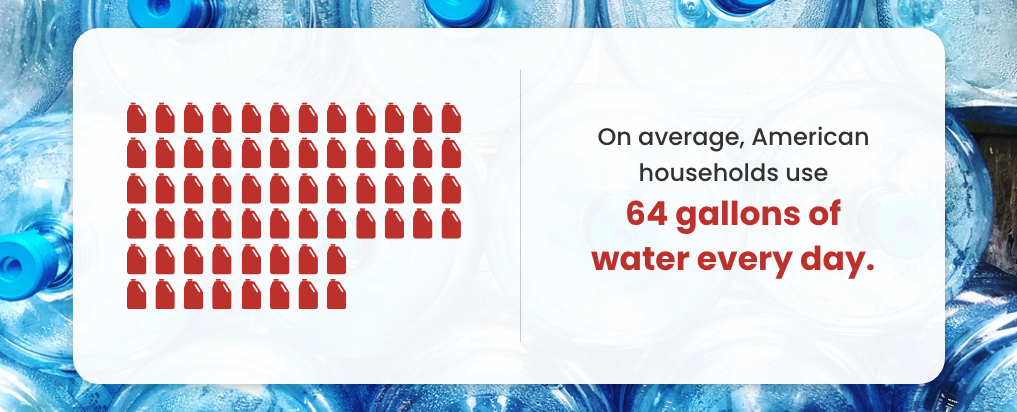
Types of Water Heaters
On average, American households use 64 gallons of water every day. Selecting the best water heater for your home saves you water, energy and other expenses. The specific heaters available for purchase may change depending on your area and where you’re shopping. Generally, you’ll find the four following types of water heaters:
1. Storage
Storage heaters are one of the most common household water tanks and can keep around 20-80 gallons of hot water ready for use at any time. They’re relatively low-cost and can run on electricity, propane, natural gas and fuel oil. Hot water from the top of the tank flows out when a hot water tap in the home opens, while cold water enters the bottom of the tank to ensure the tank is always full and heating water.
Storage tanks experience heat loss, which reduces their energy efficiency. Since water in the tank is constantly heated until it reaches the set temperature, even when water isn’t in use, standby heat loss is unavoidable. Insulating your storage tank can reduce the amount of standby heat loss and can therefore increase the efficiency of your tank.
2. Tankless
Tankless models heat water instantly without needing a storage tank. Cold water travels through a heat exchanger that either uses electricity or natural gas to deliver hot water to the tap. These heaters generally provide 7 to 12 gallons of hot water per minute and are much smaller than storage tanks. Because tankless heaters don’t have a store of hot water, models are chosen based on their flow rate rather than their tank capacity, so the size of tankless water heater you need is measured according to flow rate.
The tankless nature of these heaters means they can’t always heat enough water for multiple appliances running at once. Installing separate tankless water heaters for different devices in your home can solve this but can also increase the purchase and installation costs.
Tankless heaters are more expensive upfront than storage tanks, but they have longer lifespans and lower energy and operational costs. For homes that use around 86 gallons of water per day, tankless units can be 8-14% more energy-efficient than storage tanks. If a household uses 41 gallons of water per day, it can even be 24-34% more efficient to use.
3. Hybrid
Hybrid or heat pump water heaters don’t generate heat directly. Instead, they use electricity to pull heat from the surrounding air in and transfer it at a higher temperature to a storage tank.
This technology makes them much more efficient than tankless and storage heaters, but they can only be used in spaces where temperatures are 40-90 degrees Fahrenheit year-round. Placing them in furnace rooms can allow households in colder areas to use these heaters since the furnace room maintains the necessary temperatures for operation.
Heat pump water heaters are more expensive than storage heaters and have similar lifespans. However, the increased efficiency of hybrid heaters reduces the yearly cost of owning one and makes them less expensive to operate.
4. Solar
Solar heaters can have either active or passive heating systems and typically require the household to have an insulated solar storage tank.
Solar has expensive upfront costs, and household location and local building codes often limit its use, but it’s much more efficient than other types of water heaters. They also generally require a backup heating system, like a storage heater, for cloudy days. However, solar heating is 50% more efficient than gas or electric water heaters and has a longer life expectancy.
In addition to these water heaters, you can explore other varieties of demand-type water heaters. There are also tankless coil and indirect water heaters that use your home’s heating system to operate. However, they can be more expensive than storage tanks and more inefficient to run in households in warmer climates.
Fuel Types for Water Heaters
The type of tank you purchase will depend on cost, size and efficiency requirements. The fuel available in your area will also influence the water heater you select. There are six main fuel options for water heaters, though your existing heating systems and location affect the cost and availability of fuel:
- Natural gas: Natural gas is available throughout the United States and can power storage, tankless and indirect heaters.
- Propane: Like natural gas, propane is available across the U.S. and works in storage, tankless and indirect models.
- Electricity: This energy source has wide availability and can be used in storage, tankless, hybrid and tankless coil and indirect water heaters.
- Geothermal: Households with geothermal heat pump systems for heating and cooling their homes can use geothermal energy for their hybrid water heaters.
- Fuel oil: This is available in some locations in the U.S. for conventional storage heaters and tankless coil and indirect systems.
- Solar: Solar is mostly available in the Southwest where there is frequent sunny weather but is an option across the country for solar heaters.
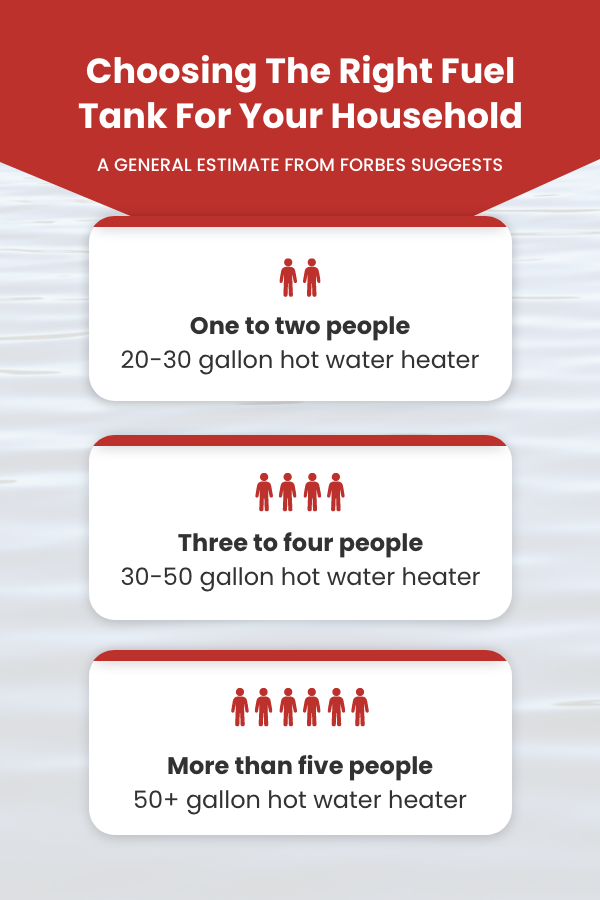
What Size Tank Do You Need?
In addition to choosing the right fuel and tank for your household, you also need to decide what size tank will best meet your family’s water requirements. Storage tank sizes range from 20 to 80 gallons but typically come in 30, 40, 50, 55 and 75 size categories.
A general estimate from Forbes suggests:
- One to two people: 20-30 gallon water heater
- Three to four people: 30-50 gallon water heater
- More than five people: 50+ gallon water heater
The amount of water usage varies by household and location. Depending on the type of heater you’ve selected, there are different methods for calculating your required water heater capacity. Below is a more accurate guide to calculating your storage tank or tankless heater needs.
Storage Tank Heater Sizing
To determine what storage heater size is right for your family, you need to find your peak hour of demand and your first-hour rating (FHR). The FHR is listed on the yellow Energy Guide label of the water tank. This is the maximum number of gallons of hot water the heater can provide in one hour. If your household is regularly exceeding this amount, it may mean you need a larger storage tank to ensure you aren’t running out of hot water during peak hours.
Once you have your FHR, you need to estimate the highest amount of water your household uses in one hour. Use Energy.gov’s Energy Saver water heater sizing chart to estimate the gallons used in that peak hour. Once you’ve evaluated your peak hour demand, you should match that number to the FHR on your desired water heater model. This will allow you to meet the maximum hourly requirements of your household without running out of hot water.
Tankless Water Heater Sizing
Figuring out your water needs for tankless units is a bit more complicated. Tankless heaters use gallons-per-minute (GPM) for sizing. There are several measurements to take to figure out your desired GPM, and thus, the best heater for you:
- Peak hour of demand: Figure out your peak hour of demand and count the number of water fixtures you use during that hour, such as faucets, showerheads and appliances.
- Flow rate: Calculate the flow rate (GPM) of each device. To do this, find the flow rate in the manufacturer guide for your fixtures. If you don’t have this, put a bowl or pot under the spigot and let it run for one minute. Measure the amount of water and multiply by 60. That number is the flow rate for that fixture.
- Maximum GPM: Take the flow rates of all the fixtures you use during your peak hour of demand and add them up to get your maximum GPM.
- Temperature rise: Next, figure out the temperature rise. Run a cold water faucet and take its temperature with a thermometer. Then, subtract this number from 120, the typical temperature in Fahrenheit desired for most water uses.
Now that you have the maximum GPM and temperature rise, you can evaluate different tankless models to find one that meets your water heating requirements.
Water Heater Upkeep and Maintenance
To increase the lifespan of your water heaters, make sure to take care of them on a consistent schedule. Changing seasons, long trips away from home and other factors can affect how you use your water heater.
Avoiding Water Heater Issues
Solving issues with your plumbing can become costly and time-consuming. Your house has many fixtures, and poor maintenance, misuse and regular wear and tear can cause problems. Making efforts to avoid common plumbing problems can save you money in the long run and keep your plumbing in good shape for longer.
Water heaters can experience different issues based on type, but you can keep an eye out for common issues by:
- Flushing the heater yearly
- Using factory recommended settings for the heater
- Regularly checking the heater for leaks
- Scheduling routine inspections with a licensed plumber
- Checking the pressure valve and temperature every six months
- Replacing anode rods in storage tank heaters to extend their lifespans
Efficiency Tips for Your Water Heater
Along with routine maintenance, you can take a few steps to help with the efficiency of your water heater and reduce your heating expenses. Applying different plumbing tips and tricks can help save you money and get the best usage. To help with water heater efficiency, you can:
- Follow factory settings and recommendations for your heater
- Have thicker insulation installed in your water storage tanks and pipes
- Turn off your water heaters before vacations
- Install low-flow showerheads and faucets
- Use less hot water
- Purchase an energy-efficient water heater
- Check for leaks routinely
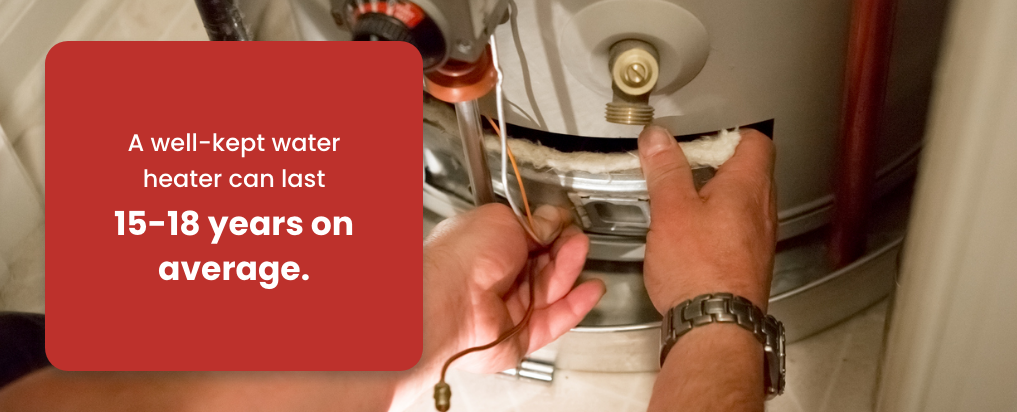
Inspecting a Water Heater
When purchasing a new home, you should have a plumbing checklist for evaluating potential issues as you inspect the house. Checking that everything is in working order can save you expenses once you move in. It can also ensure you don’t purchase a home only to find it’s full of plumbing and maintenance issues.
When inspecting a house’s water heater, look for:
- Visual indicators: Check the pressure and temperature valves, along with the heater itself, for rust, corrosion, leaks and burn marks. Make sure there’s an expansion tank, too. Units with no expansion tank typically have warranties that are void and the system can fail prematurely. Lastly, see that the temperature is set no higher than 120 degrees.
- Age and inspection dates: A well-kept water heater can last 15-18 years on average. Check the age and last date of inspection for the heater. If an inspection hasn’t been performed in the previous six months to a year, it could signify a poorly-maintained water heater.
- Size: The water heater capacity will affect how much hot water you receive. If the size of the current unit isn’t large enough for your household, it’ll need replacement.
- Location: The location of a heater may make it more likely to damage essential sections of the house if it leaks. Additionally, ensure that it’s in a place where you’d be comfortable making routine inspections.
In addition to going over this checklist yourself, always have a licensed plumber inspect the water heater to ensure it’s up to code. This helps protect you and your house from any damage or unforeseen expenses down the road.
Contact Enduric Plumbing for Winston-Salem Water Heating Services
At Enduric Plumbing, we understand the importance of properly maintaining and installing water heaters in your home. Our experienced plumbing contractors are dedicated, friendly professionals who deliver quality work with excellent customer service. We offer full-service residential and commercial plumbing services and deliver exceptional results that endure the test of time.



